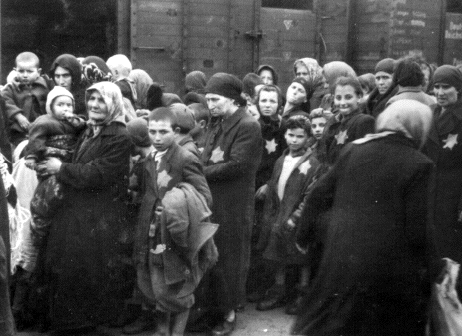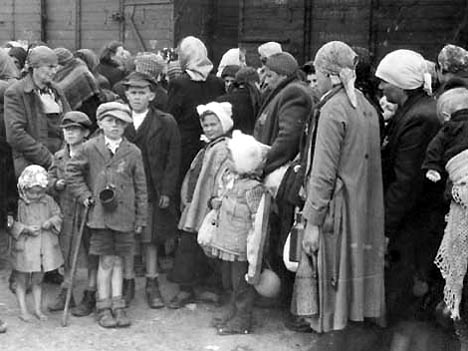Jews for Trucks
10,000 trucks for one million
Jews
 Hungarian Jews arrive
at Auschwitz-Birkenau, May 26, 1944
Hungarian Jews arrive
at Auschwitz-Birkenau, May 26, 1944
 Hungarian Jews arrive
at Birkenau, May 1944
Hungarian Jews arrive
at Birkenau, May 1944
In the book entitled "The Last Days,"
David Cesarani wrote that an attempt to save the Hungarian Jews
was made by Otto Komoly and Dr. Rezo (Rudolf) Kastner, two leading
figures in the Jewish Relief and Rescue Committee in Hungary.
In 1942, the Jewish Council of Slovakia had tried to bribe Dieter
Wisliceny, an SS man, to stop the deportation of the Slovakian
Jews. When Wisliceny arrived in Budapest, Komoly and Kastner
revived the proposal first made to Wisliceny in Slovakia, offering
him a $2 million bribe to save the Hungarian Jews from deportation
to the death camps. Wisliceny suggested a down payment of $200,000
to show good faith, but while Komoly and Kastner were trying
to raise the money, Wisliceny left Budapest to organize the deportation
of the Jews in eastern Hungary to Auschwitz. According to Cesarani,
the Jews confronted Wisliceny with his betrayal, and "he
coolly offered to save 600 Jews of their choosing. Soon afterwards
Eichmann himself took up the negotiations."
The following information is from the
book "Auschwitz, a New History" by Laurence Reese:
On April 25, 1944, in his office at the
Hotel Majestic in Budapest, Eichmann met with Joel Brand, another
leading member of the Jewish Relief and Rescue Committee. Brand
had already attended previous meetings with Eichmann and other
SS officers in an attempt to bribe them to allow a number of
Jews out of Hungary. Now Eichmann said to Brand, "I am prepared
to sell one million Jews to you."
Eichmann proposed an exchange of "Blood
for Goods," in which the British and the Americans would
give the Nazis one new truck for every one hundred Jews. Eichmann
promised that the trucks would only be used on the Eastern front
where the Germans were fighting against the Communist Soviet
Union. Brand was asked to go to Istanbul in Turkey to negotiate
the deal. Eichmann hoped to obtain 10,000 trucks in exchange
for one million Jews. But even before Brand reached Turkey on
May 19, 1944, Eichmann had already ordered the deportation of
the Hungarian Jews, which began on April 29, 1944.
According to Laurence Rees, SS officer
Kurt Becher, who was a Lt. Col., equal in rank to Eichmann, was
trying to blackmail the Weiss family, owners of the biggest industrial
conglomerate in Hungary, into giving its shares to the SS in
return for safe passage out of the country. Rees wrote:
By the time of his meeting with Brand,
Eichmann knew that his rival Becher had successfully arranged
for shares of the Manfred-Weiss works to be transferred to the
Nazis; in return, about fifty members of the Weiss family were
allowed to leave and head for neutral countries.
Brand was accompanied to Istanbul by
another man named Bandi Grosz, a former agent of the Abwehr,
the German intelligence agency, whose operations in Hungary had
been taken over by an SS officer, Lt. Col. Gerhard Clages. At
the last meeting with Brand, SS officers Clages, Becher and several
other Nazis had been present.
The following quote is from the book
by Laurence Rees:
It was not until May 26, 1944 that
the head of the Jewish Agency in Palestine notified a British
diplomat, Sir Harold MacMichael, of the Nazis' proposals. But
it only took the British a matter of moments to reject the Brand
mission, seeing it as an attempt to split the Western allies
from the Soviets.
[...]
In mid-June, Grosz was interrogated
in Cairo by British intelligence officers and the story that
he told was a surprising one. He claimed that Brand's mission
was only a camouflage for his own. Under the direct orders of
Himmler, Grosz had been sent to facilitate a meeting in a neutral
country between high-ranking British and American officers and
two or three senior figures from the SD - Himmler's own intelligence
service. The purpose of the assignation was to discuss a separate
peace treaty with the Western allies so that - together - they
could fight the Soviet Union.
Himmler's offer was immediately turned
down. The British perceived Germany to be a threat to the British
policy of "balance of power" and had refused all offers
to become allies with Germany before the war; they had also refused
several peace offers from Germany before the invasion of the
Soviet Union in June 1941. Great Britain and America needed the
help of the Soviet Union in their plan to destroy Germany and
in return, Churchill and Roosevelt had promised eastern Europe
to the Communists as early as 1943 at the Tehran Conference.
According to Wikipedia, at the Tehran
Conference, Churchill and Roosevelt agreed to the following:
Poland's borders were declared to
lie along the Oder and Neisse rivers and the Curzon line, despite
protests of the Polish government-in-exile in London. Churchill
and Roosevelt also gave Stalin free rein in his own country,
and allowed the USSR to set up puppet communist governments in
Poland, Czech Republic, Slovakia, the Baltic states, Romania,
and other Eastern European countries.
By turning down Himmler's offer of an
alliance against the Soviet Union, the lives of a million Hungarian
Jews were sacrificed; in the end, the British lost their empire
and Hungary became a Communist country. Great Britain and America
eventually became allies with Germany in 1948 against the Soviet
Union in the Cold War, which lasted until 1989.
This page was last updated on September
25, 2007
|